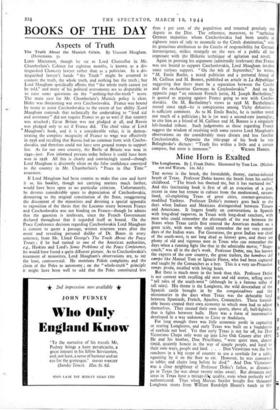BOOKS OF THE DAY
Aspects of Truth
The Truth About the Munich Crisis. By Viscount Maugham. (Heinemann. ss.
LORD MAUGHAM, though he sat as Lord Chancellor in Mr. Chamberlain's Cabinet for eighteen months, is known as a dis- tinguished Chancery lawyer rather than as a politician. In a dis- tinguished lawyer's hands "the Truth" might be assumed to connote the truth, the whole truth, and nothing but the truth ; but Lord Maugham specifically affirms that 'the whole truth cannot yet be told," and many of his political assessments are so disputable as to raise some questions on the " nothing-but-the-truth " score. The main case for Mr. Chamberlain's Munich policy is clear. Hitler was threatening war over Czechoslovakia. France was bound by treaty to assist Czechoslovakia to the extent of her ability (Lord Maugham contends that technically the undertaking to "lend aid and assistance" did not require France to go to war) if that country was attacked ; Great Britain was not pledged at all, and Russia was pledged only to act if France did. The chief value of Lord Maugham's book, and it is a considerable value, is in demon- strating the complete incapacity of France to wage war effectively in 1938 and recalling that Russia had no common front with Czecho- slovakia, and therefore could not have sent ground troops to support her. As for our own country, the Battle of Britain was won in two—just. Few informed persons today believe it could have been won in 1938. All this is clearly and convincingly stated—though Lord Maugham is discreetly silent on the false confidence conveyed to the country in Mr. Chamberlain's "Peace in Our Time" assurance.
If Lord Maugham had been content to make that case and leave it so, his booklet, though not carrying matters much farther, would have been open to no particular criticism. Unfortunately, he devotes considerable space to depreciation of Czechoslovakia, demurring to the original constitution of the State, exaggerating the discontent of the minorities and devoting a special appendix to exposition of the thesis that the Locarno treaty between France and Czechoslovakia was not binding on France—though he admits that the question is irrelevant, since the French Government declared throughout that it regarded itself as bound. On the Peace Conference decision regarding Czechoslovakia Lord Maugham is content to quote a passage, written nineteen years after the event and revealing personal dislike of Dr. Benes in every sentence, from Mr. Lloyd George's The Truth About the Peace Treaty ; if he had turned to one of the American authorities, e.g., Haskins and Lord's Some Problems of the Peace Conference, he would have found a quite different picture. As to Czechoslovakia's treatment of minorities, Lord Maugham's observations are, to say the least, controversial. He mentions Polish complaints and the claim of the Poles to autonomy ; on the " whole-truth " principle it might have been well to add that the Poles constituted less
than i per cent. of the population and returned precisely one deputy to the Diet. The reference, moreover, to "turbulent German majorities whom Czechoslovakia had been unable in eighteen years of rule to reconcile to the Czech domination," with its gratuitous attribution to the Czechs of responsibility for German intransigence, strikes strangely on the ears of a public all too cognisant with the Hitlerite technique of agitation and revolt.
Again in pressing his argument (admittedly irrelevant) that France was not bound to support Czechoslovakia, Lord Maugham invokes some curious support. "On the 6th of September," he writes, "M. Emile Roche, a noted politician and a personal friend of M. Caillaux and M. Bonnet, published an article in La Republique suggesting that there must be a separation between the Czechs and the ex-Austrian Germans in Czechoslovakia." And on the opposite page "an eminent French jurist, M. Joseph Barthelemy," is quoted as arguing against France going to war with Czecho- slovakia. On M. Barthelemy's views in 1938 M. Barthelemy's record since 1938—he is conspicuous among Vichy defeatists— is sufficient comment. As to M. Emile Roche, he is neither noted nor much of a politician ; he is (or was) a second-rate journalist ; to cite him as a friend of M. Caillaux and M. Bonnet is a singularly left-handed tribute. Such judgements as these regarding France suggest the wisdom of receiving with some reserve Lord Maugham's observations on the considerably more distant and less familiar Czechoslovakia. Opposite the title-page of his book he sets Bolingbroke's dictum: "Truth lies within a little and a certain


























 Previous page
Previous page